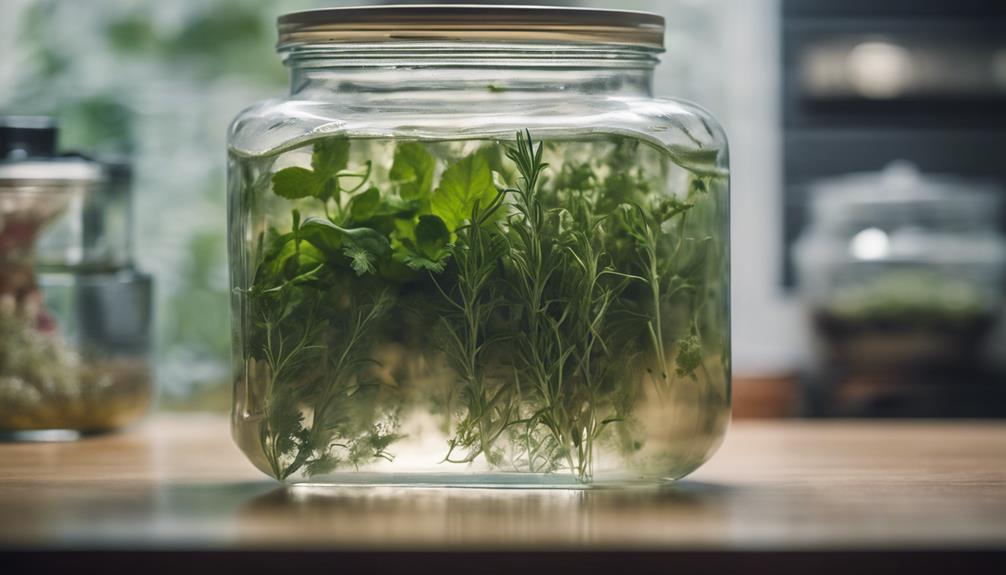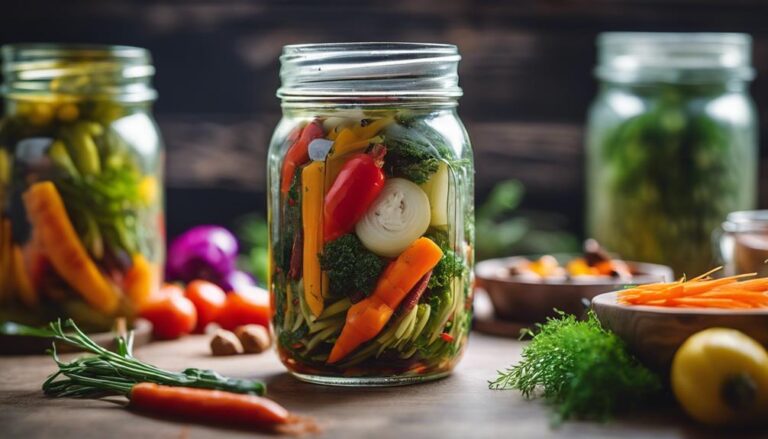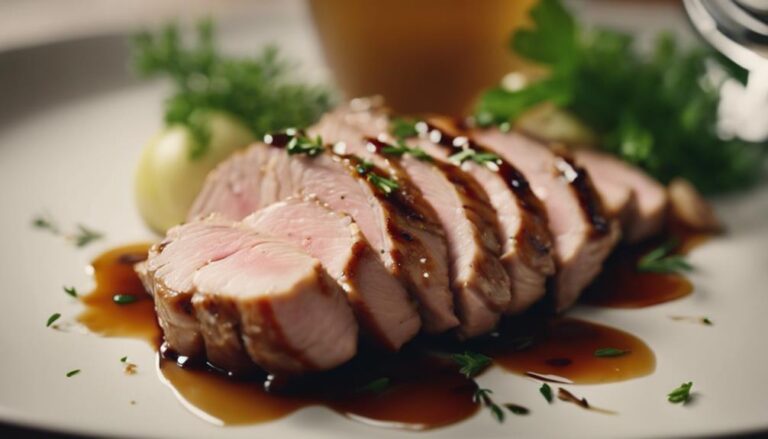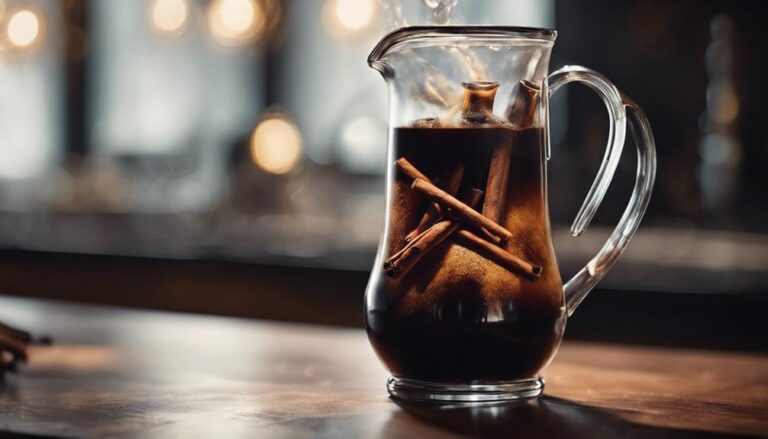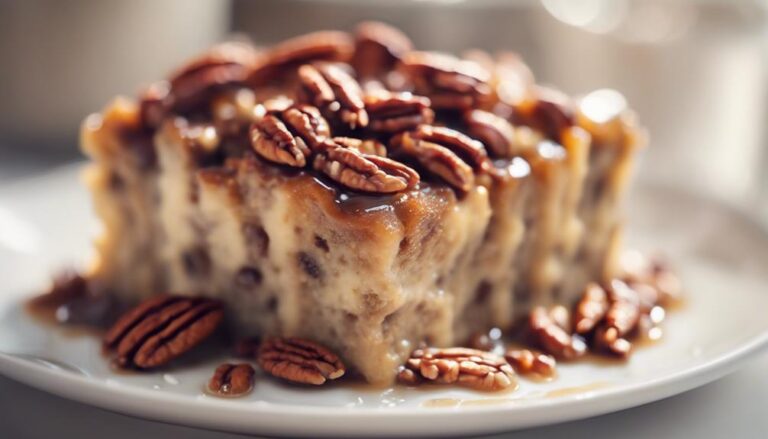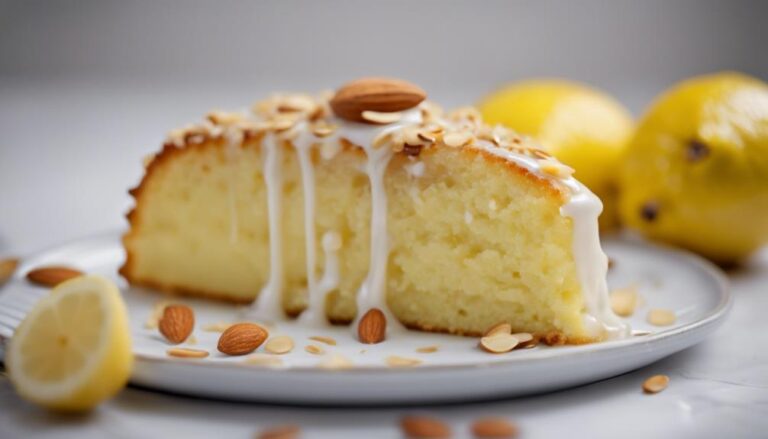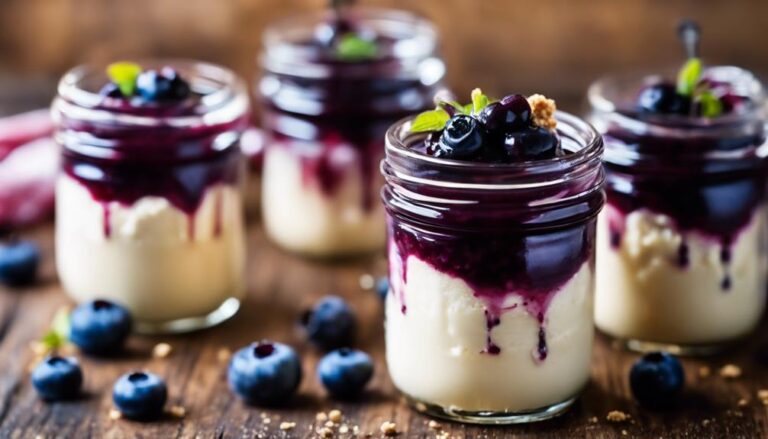Sous Vide Herbal Tea for Digestion
Improve your digestive health with sous vide herbal tea. Peppermint relaxes muscles, chamomile soothes, and fennel eases gas. The blend supports gut wellness and aids digestion effectively. Infuse lavender with vanilla, ginger with honey, or mint with lemon for flavor variety. Sous vide extraction guarantees precise nutrients and flavors, elevating the tea's benefits. Create a well-balanced brew that nurtures both body and soul. Crafted carefully for top digestion support, sous vide herbal tea offers a potent and soothing experience.
What You Will Learn Here
- Sous vide ensures precise temperature for optimal flavor extraction
- Herbal tea brewed gently for maximum nutrient retention
- Eliminates risk of oversteeping or scorching delicate herbs
- Enhances herbal tea benefits for digestive wellness
- Craft nuanced flavors to support digestion and overall well-being
Ancient Herbal Remedies
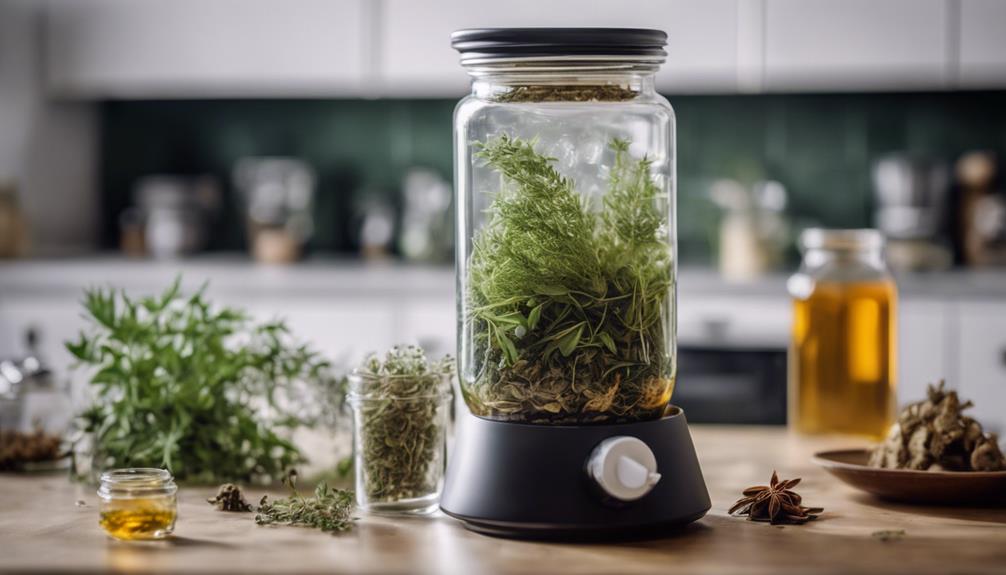
Ancient civilizations such as the Greeks and Egyptians turned to herbal remedies to address digestive issues.
Herbal teas, containing ingredients like peppermint, chamomile, and fennel, were commonly used for digestive health in the past.
These traditional practices laid the foundation for modern herbal remedies that continue to offer benefits for digestive wellness.
Herbal Remedies Overview
Herbal remedies have played an essential role in traditional medicine practices across various cultures for centuries, utilizing natural ingredients to address health concerns and promote well-being.
Herbal teas, like chamomile, peppermint, and fennel, have been valued for their soothing and digestive properties. Marshmallow root, often included in herbal blends, is known for its mucilaginous properties, which can help soothe the digestive tract.
These ancient remedies are based on the belief that nature provides powerful solutions for common ailments. Through the use of plants, roots, and other natural ingredients, traditional herbal remedies have stood the test of time and continue to be valued for their holistic approach to health and wellness.
Enjoy a cup of tea infused with these herbal remedies to support your digestion and overall well-being.
Traditional Healing Practices
Drawing upon centuries of traditional wisdom and healing practices, various civilizations, including the Egyptians, Greeks, and Chinese, harnessed the power of herbal teas to address a range of medicinal needs. Traditional healing practices often involved balancing the body's energies and promoting overall health through herbal remedies. Herbs like ginger, peppermint, and chamomile were commonly used in ancient herbal tea recipes for digestion. Brewing methods played an essential role in extracting the maximum benefits from these herbs. Historical texts and archaeological findings provide valuable insights into the use of herbal teas in traditional healing practices.
| Ancient Civilizations | Herbal Remedies | Brewing Methods |
|---|---|---|
| Egyptians | Ginger | Infusion |
| Greeks | Peppermint | Decoction |
| Chinese | Chamomile | Steeping |
Modern Health Benefits
Utilizing age-old remedies rooted in herbal traditions, modern research highlights the significant health benefits of incorporating herbal teas like chamomile, peppermint, and fennel to support digestive wellness. These herbal teas have been shown to soothe the digestive system, reduce bloating, ease gas, and alleviate indigestion.
Through the practice of sous vide herbal tea preparation, where herbs are infused at precise temperatures, the active compounds are effectively extracted for best digestion support. By harnessing the therapeutic properties of these herbs in a controlled manner, sous vide herbal teas offer a convenient and potent way to promote gut health.
Embracing these modern health benefits of herbal teas can be a simple yet powerful way to enhance your digestive well-being.
Digestive Herbal Tea Ingredients
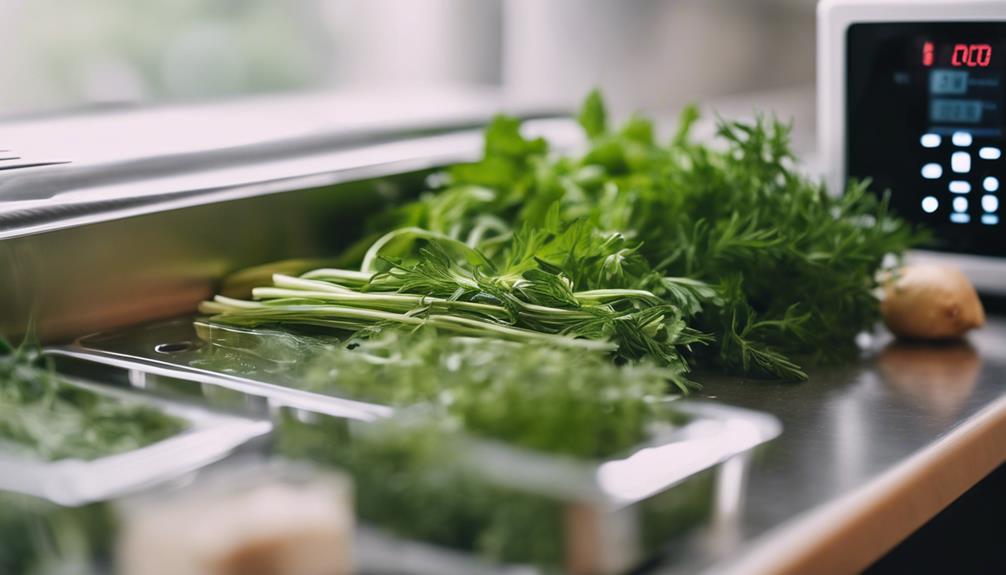
When crafting a digestive herbal tea blend, consider incorporating ingredients like peppermint, chamomile, fennel, and other digestive-friendly herbs for the best gut health support. These herbs offer various benefits for digestion:
- Peppermint: Known for its ability to relax the digestive tract muscles, peppermint can help reduce bloating and gas, making it easier for your system to process food.
- Chamomile: With its anti-inflammatory properties, chamomile can soothe the stomach lining, reduce irritation, and promote healthy digestion, especially beneficial for those with sensitive stomachs.
- Fennel: Renowned for its carminative properties, fennel can help alleviate gas and bloating, providing you with better digestive comfort after meals.
Combining these herbs in a digestive herbal tea blend creates a potent mix that not only supports overall gut health but also aids in the digestion process. By incorporating these ingredients into your tea routine, you can enjoy a soothing and effective way to care for your digestive system.
Tasty Herbal Infusions
When creating delicious herbal infusions, consider experimenting with different herbs such as lavender for a floral note, lemon ginger for a zesty kick, or mint for a rejuvenating twist. These herbal combinations not only add flavor but also offer potential digestive benefits, making them excellent choices for soothing teas.
Herbal Tea With Lavender
Enhance your tea-drinking experience with the calming properties and unique flavor profile of lavender herbal tea blends.
- Relaxation: Lavender herbal tea is renowned for its relaxing effects, helping you unwind after a long day.
- Tranquility: The floral aroma of lavender in herbal tea promotes a sense of tranquility, easing stress and anxiety.
- Improved Sleep: Enjoy a cup of lavender herbal tea before bed to potentially improve sleep quality and alleviate insomnia.
Incorporating lavender into your herbal tea not only adds a pleasant taste but also offers potential health benefits like digestive support. So, brew a cup, sit back, and savor the soothing essence of lavender in your tea for a moment of relaxation and well-being.
Lemon Ginger Infusion
To create a revitalizing Lemon Ginger Infusion, you can combine the zesty brightness of lemon with the warm spiciness of ginger through the precise sous vide cooking method. This sous vide herbal tea preparation guarantees prime flavor extraction, resulting in a more concentrated and nuanced flavor profile compared to traditional steeping methods.
Here's why you'll love this infusion:
- The combination of lemon and ginger offers a delightful sensory experience that invigorates the senses.
- Sous vide cooking allows for the extraction of essential oils and compounds, maximizing the health benefits in your herbal tea.
- The invigorating and soothing properties of this herbal infusion can aid in digestion, making it a perfect choice for a post-meal beverage.
Minty Herbal Elixir Recipe
For an energizing and digestive herbal tea blend, try preparing the Minty Herbal Elixir recipe, which combines peppermint, chamomile, and fennel using the precise sous vide cooking method. Here's why you'll love it:
- Optimized Flavors: Sous vide guarantees that the delicate flavors of peppermint, chamomile, and fennel are fully extracted, creating a harmonious blend.
- Nutrient-Dense: The slow infusion process of sous vide maximizes the extraction of nutrients from the herbs, providing a potent herbal elixir.
- Digestive Support: By following the recommended cooking parameters, you'll craft a perfectly infused herbal tea that promotes digestion and supports overall gut health.
Experience the benefits of sous vide herbal tea infusion with this minty elixir for a soothing and flavorful beverage.
Enhancing Herbal Tea Flavors
Experiment with adding complementary ingredients like citrus peels, cinnamon sticks, or honey to elevate the taste of your herbal tea.
By combining herbs like chamomile, peppermint, and lavender, you can create a well-rounded and soothing blend.
Adjusting the herb ratios allows you to tailor the flavor profile to your preferences, whether you desire a stronger minty kick or a more delicate floral essence.
Flavor Pairing Tips
Enhancing the flavors of herbal teas can be achieved by skillfully combining complementary ingredients to create a harmonious taste experience.
For a soothing cup of chamomile tea, consider adding honey and a dash of cinnamon to elevate its comforting profile.
If you're brewing peppermint tea, try squeezing fresh lemon juice for a citrusy zing that enhances its invigorating qualities.
For a fragrant and calming experience, infuse lavender with a hint of vanilla extract.
To spice up ginger tea, include a slice of fresh ginger root and a touch of raw honey for a warming kick.
Add a sprig of fresh mint to lemon balm tea for an exhilarating twist that revives your herbal blend.
Aromatics for Infusion
To elevate the flavors of your herbal tea blends, consider infusing aromatics like citrus peels, cinnamon sticks, and honey for a more dynamic taste experience. When preparing your tea, bring water to a gentle boil and then pour it over your selected herbs and aromatics in a heatproof container.
Let the infusion steep for about 5-10 minutes for the flavors to meld together. For a cold infusion, you can mix the ingredients in a pitcher and let them sit in the refrigerator overnight.
Citrus peels will add a zesty freshness, cinnamon sticks bring warmth and a hint of spice, while honey sweetens and balances the flavors. Experiment with different combinations to find the perfect match for your one cup of herbal tea.
Herbal Tea Enhancements
For a more vibrant and complex flavor profile in your herbal tea, consider infusing fresh citrus peels, cinnamon sticks, honey, and other aromatic ingredients.
Enhance your tea with a citrus infusion by adding lemon or orange peels for a zesty kick. To introduce a warm and spicy element, experiment with a cinnamon stick during the infusion process, bringing cinnamon sweetness to the brew.
Balancing out any strong flavors, a touch of honey can sweeten your herbal tea. For floral aromatics, try incorporating dried flower petals like rose or hibiscus into your blend. To elevate the aroma, consider adding cardamom pods or cloves for a subtle, exotic twist.
Experimenting with these enhancements will create a delightful herbal tea experience for you and those you serve.
Final Thoughts
What key considerations should you keep in mind when concluding your sous vide herbal tea preparation for best digestion?
As you wrap up your sous vide herbal tea process, take a moment to reflect on the health benefits this method offers. The precise temperature control in sous vide guarantees ideal extraction of flavors and nutrients from the herbs, providing you with a tea that isn't only delicious but also rich in health-promoting compounds.
Consider the culinary inspiration behind your herbal tea creation. Sous vide allows for a consistent and controlled infusion of herbs, resulting in a well-balanced and nuanced flavor profile. This can elevate your tea-drinking experience and inspire you to explore different herbal combinations to support digestion and overall well-being.
In your final thoughts, appreciate the convenience that sous vide brings to tea preparation. Its hands-off approach eliminates the risk of oversteeping or scorching the herbs, giving you a hassle-free way to enjoy a delicate and flavorful tea that can aid in digestion.
Embrace the benefits of sous vide herbal tea and savor each sip with gratitude for the care you've put into crafting a tea that nurtures both body and soul.
Frequently Asked Questions
What Herbal Tea Is Good for Digestion?
When it comes to digestive health, herbal teas offer a natural remedy. Chamomile relaxes muscles, peppermint soothes, ginger boosts juices, fennel reduces bloating, and lemon balm calms. Brewing these teas properly maximizes their benefits for your digestion.
What Tea Heals the Stomach Lining?
Soothe your stomach lining with chamomile's soothing properties, heal with ginger's benefits, and calm with peppermint's aid. These herbal teas are known for their digestive support, making them great choices for stomach health.
What Tea Is Good for Digestion and Sleep?
For better sleep and digestion, chamomile, peppermint, and lavender teas work wonders. Chamomile relaxes, peppermint soothes the stomach, and lavender calms. Blending chamomile and peppermint targets both issues, aiding in digestion and promoting relaxation for improved sleep quality.
Can You Use Dried Herbs in Sous Vide?
Yes, you can utilize dried herbs in sous vide for herbal infusion. Dried herbs are perfect for this process as they accurately regulate flavors evenly. Sous vide guarantees precise temperature control, enabling the herbs to infuse the tea flavors effectively.
Conclusion
Incorporating sous vide herbal tea into your routine can provide a natural and effective way to support digestion.
By infusing a blend of ancient herbal remedies with modern cooking techniques, you can create flavorful and soothing teas that promote gastrointestinal health.
Experiment with different ingredients and flavors to find the perfect combination that works best for you.
Cheers to better digestion and overall well-being!
